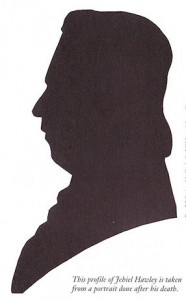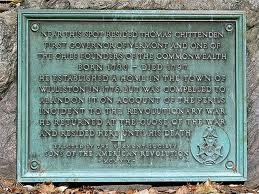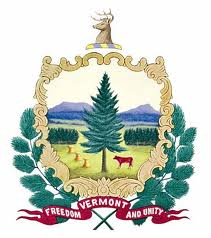Joseph/Samuel/Ephraim/Jehiel HAWLEY
Jehiel Hawley, son of Ephraim Hawley and Sarah (Phebe) Curtis, was born in Stratford, Connecticut on 14 February 1712. He settled with his father, Ephraim, about 1732, in the southeastern part of New Milford, now Bridgewater, Connecticut.  He resided there for about thirty-two years and was a farmer and an enterprising man in public affairs.

The Russell Collection of the Martha Canfield Library, Arlington, Vermont
Jehiel Hawley was Captain of the militia and served several years as a representative in the General Assembly of Connecticut, from the town of New Milford.  He was chosen annually over twelve years lay Reader of the Episcopal Church in nearby Roxbury, Connecticut. Roxbury was organized in 1740 and was the birthplace of Col. Ethan Allen (according to Allen’s own narrative). Capt. Jehiel Hawley was to become better acquainted with this Revolutionary hero before he died.
14 February 1760, his forty-eighth birthday, he with Roger Sherman, signer of the Declaration of Independence, organized a company to settle a township, “about twelve miles square, lying eastward of Fort Edward upon Wood Creek” in the colony of New York. Forty men signed this compact, among them, Jehiel Hawley, heading the list, and four of his sons, namely, Matthew Hawley, Andrew Hawley, Abel Hawley, and Gideon Hawley. This was done in a response to a published invitation of the Lt. Governor of the New York Colony, but the proposition did not succeed.
In 1761, a petition was presented to the Connecticut Legislature for authority to raise money by lottery, for the purpose of clearing obstructions in the Housatonic River and making it navigable, and Jehiel Hawley, with six others, was appointed a committee to sell the tickets, raise and appropriate the money to accomplish the object. After considerable money was raised and in the hands of William Tanner, of Cornwall, one of the committee, he became sick and died, and the money could not be found nor obtained from any property of his. This involved the whole committee, and report says Jehiel Hawley and his father, Ephraim, who had become security, lost much money by this undertaking.
In 1764, Jehiel Hawley, his brother, Josiah Hawley and their father, Ephraim Hawley, then about 72 years of age, removed to the New Hampshire Land Grants, now Arlington, in the present State of Vermont, where they became leading landholders of the township, three other men only having preceded them in 1763, in the commencement of the settlement of the town.
The journey into the wilderness of the Green Mountains was no doubt difficult traveling in the primitive manner of the time. Capt. Jehiel and his family were first settlers at Arlington. He was known as the “Father of the Town in both State and Church.” He built the first frame house in Arlington in 1764 and soon owned one of the largest farms.
He was a man of such integrity that he had the confidence of all who knew him. At a meeting held in Burlington, Vermont on October 21, 1772, Jehiel Hawley and James Breckenridge were chosen as delegates by the New Hampshire Grantees to visit England and petition the King for confirmation of the grants made by New Hampshire against encroachment of New York patentees.
A dispute had arisen between the Colony of New York and New Hampshire, concerning certain titles and claims to lands comprehended in the boundaries of the latter, the right to which could not be ascertained without sending agents for both Colonies to England.
To blacken the character of the Vermont agents, and thereby invalidate their agency, some people in New York were very active, but their efforts did not succeed. In England he was treated with the most flattering marks of respect by some of the first characters, and by the Earl of Dartmouth in particular; and such was the estimation in which his judgment and prudence were held by the copartners of the agency that they would not act without his cooperation, and by his means chiefly were the Vermont claims substantiated.
After his return from England he continued Reader of the church in Arlington.  Jehiel sided with the British in the War for Independence because he did not believe the Patriots could win the war or govern properly. He admitted that the settlers in Vermont had suffered from the New York land grabbers, but did not see how the English King had harmed them. During the American Revolution, Jehiel declared himself on the side of the Crown.  He was quoted as saying:
Man is a free agent. The question between America and the mother country is not decided. Each party has a right of thinking as he pleases. Today these men are in our power, tomorrow we may be in theirs. That mercy we would receive from our enemies is certainly due to such as are in our hands. Let it be known that we are Christians, whose duty it is to be merciful and to forgive our enemies.
The Green Mountains were a hot bed of revolutionary action and attitudes.   Ethan Allen and the Green Mountain Boys were instrumental in the area. It seems incredible that Capt. Jehiel Hawley could retain his loyalty to the Crown amid such defenders of Republican principles.
Jehiel Hawley joined the British forces and fought with them at the Battle of Bennington in August 1777. He was arrested in Arlington and jailed at Litchfield, Connecticut. He was able to obtain his release based on his reputation and integrity. Knowing of no place safe from recapture, Jehiel was obliged to join the army of General Burgoyne, who was then on this side of Lake Champlain, and who appointed him president of a Board of Examiners to ascertain who were and who were not loyalists among his prisoners. Before this Board persons frequently were brought who were not loyalists, to whom Mr. Hawley was always wont to show every indulgence compatible with his office, even when his coadjutors were of a different opinion.
After ill-treatment and seizure many men were enlisting in Loyalist Regiments, such as Queen’s Loyal Rangers a provincial Corp, and continued to escape, under hardship, to Montreal. Following the capture of Burgoyne in the Battle of Saratoga, one of the articles of capitulation was that those who had not taken up arms might go to British North America. Those very people who had so much abused and persecuted him before, now invited him to return with them to Arlington. But firm to his purpose he undertook the journey to Canada, following family members. Many nearly starved on the way to the British colonies to the North and Jehiel Hawley did not live to get there. He died of dysentery on November 2nd, 1777 at Shelbourne, Vermont near the widening of Lake Champlain.
Thus ended the life of this truly great and good man. Â Later, an American wrote,
Had he not been tainted with devotion to the King,
he would have been ranked among the honored in History
.jpg)
Jehiel is buried where he died, along the shores of Lake Champlain. Family members who had stayed behind erected a memorial tombstone in St. James Episcopal Church burial grounds in Arlington, Vermont. This was the church originally built by Jehiel Hawley.
.jpg)
This stone was erected in 1792 in memory of Jehiel Hawley in the churchyard of St James, the church he founded.
Ironically it is immediately adjacent to the grave of Ethan Allen’s wife.
Jehiel Hawley died six years before the end of the War.  He died believing that the differences between Great Britain and the American colonies would be settled. He also believed that people on both sides had the right to think as they pleased about the war. If he had lived longer, he may have changed his mind about the Revolution.  As it happened, he died a Tory. Americans are proud of our right to speak our minds, even when unpopular. Jehiel Hawley was a brave man and a good public servant, and he spoke his mind. We should honor him, even if he chose the losing side.
Jehiel’s home and land was confiscated two years after his death in 1779 and sold to Thomas Chittenden, Governor of Vermont.when Jehiel left the confiscated house which he had built with so much hard labor but abandoned when he left for Canada. This house stands on the hillside at the curve of the road to East Arlington near the present Masonic Hall.

This home was built by Jehiel Hawley and assumed by Chittenden after its seizure.
A Historical Marker states that, “Here was the home of Thomas Chittendon.” A historian tells of the legend of the State Seal, which says that a British Officer, while visiting Chittendon in the Hawley house, was so impressed by the western vista, as seen from his room, that he engraved it on a horn drinking cup. This engraving, with minor changes, was later adopted for the state Seal of Vermont, being first accepted in February 20th, 1779.
Following the Treaty ending the war, the area entered the new Union as the State of Vermont, the fourteenth state.

The scene on the early State Seal of Vermont was inspired by the view of the Green Mountains from the home of Jehiel hawley.
    Sources:  Loyalist Lineages in Canada, Vol. II, Pt I, page 491
    Three Hundred Colonial Ancestors and War Service, page 142. Â
    THE HAWLEY RECORD, page 506, note 12
    “Lost to History”, Historic Roots, A Magazine of Vermont History, Vol 4, No 3


